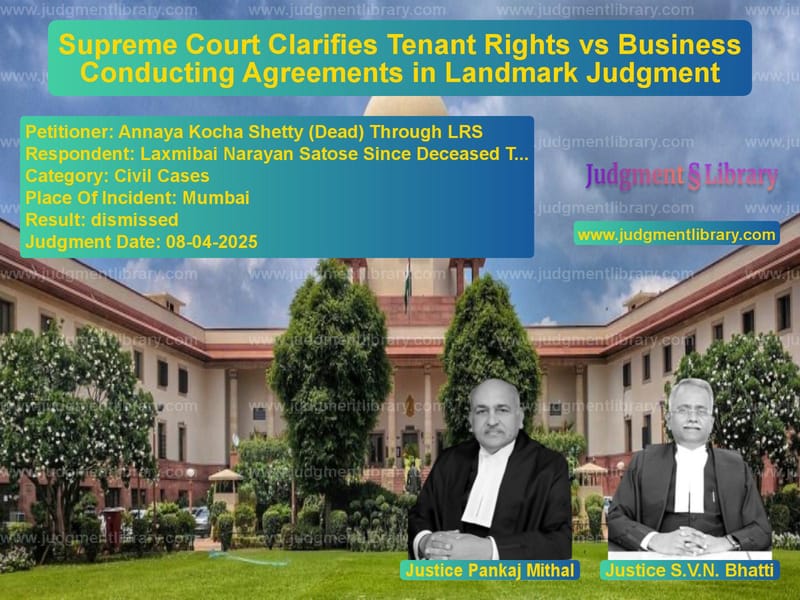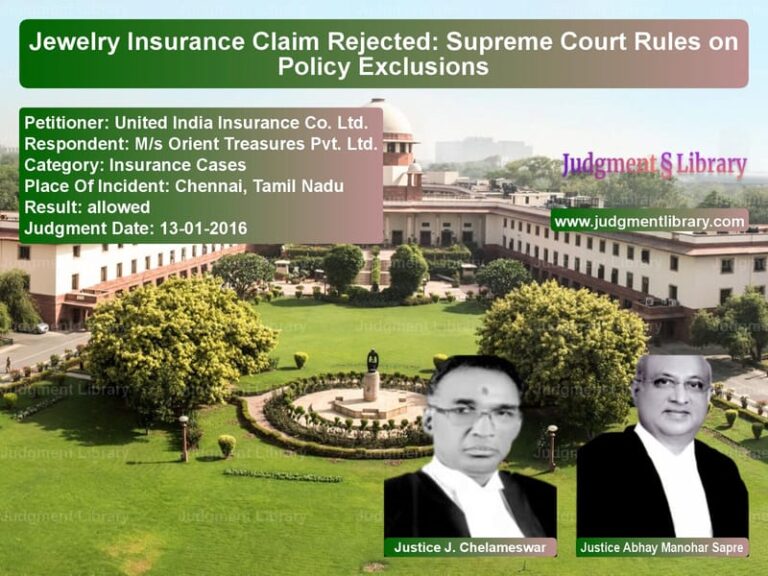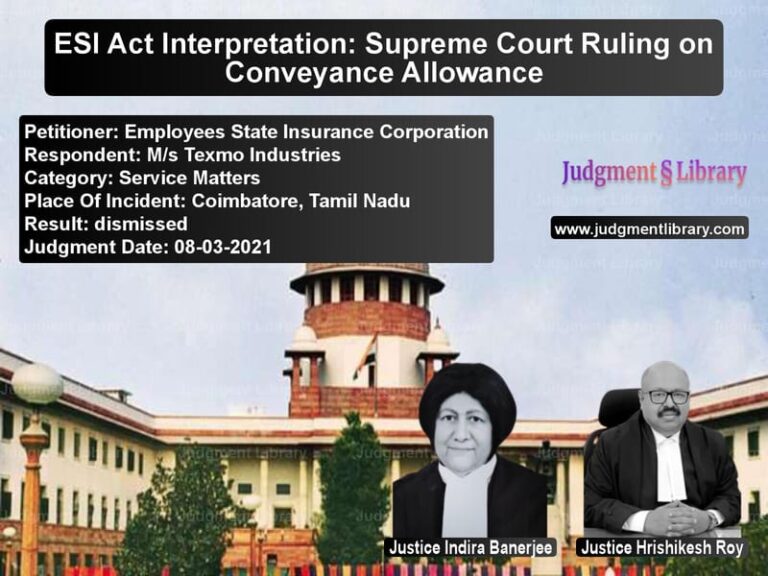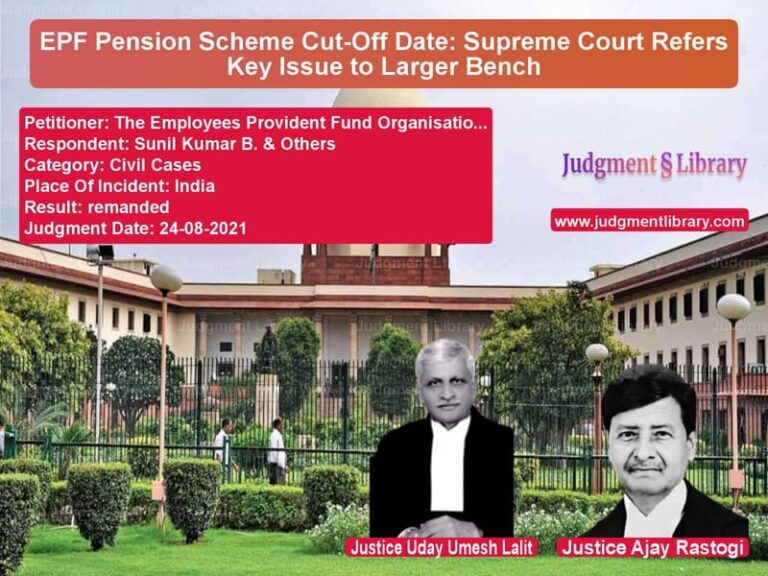Supreme Court Clarifies Tenant Rights vs Business Conducting Agreements in Landmark Judgment
In a significant ruling on landlord-tenant relationships, the Supreme Court of India recently delivered its judgment in Annaya Kocha Shetty (Dead) Through LRS vs Laxmibai Narayan Satose Since Deceased Through LRS & Others. The case, decided on April 8, 2025 by Justices Pankaj Mithal and S.V.N. Bhatti, revolved around the interpretation of a 1967 agreement regarding a hotel business in Mumbai and whether it constituted a tenancy or a business conducting arrangement.
Background of the Case
The dispute originated from a suit filed by Annaya Shetty (since deceased, represented by legal heirs) claiming deemed tenancy rights under Section 15A of the Bombay Rents, Hotel and Lodging House Rates Control Act, 1947 (Bombay Rent Act) for shop premises in Dadar, Mumbai. The plaintiff had entered into an agreement dated August 16, 1967 with Laxmibai Narayan Satose (defendant no.1) to operate a hotel business on the premises.
The core dispute centered on whether this agreement created a landlord-tenant relationship (making the plaintiff a ‘deemed tenant’ under the Rent Act) or merely a business conducting arrangement where the plaintiff operated the hotel business while the defendant retained ownership and control.
Key Arguments
Petitioner’s Arguments (Annaya Shetty’s LRs):
Presented by Senior Counsel Shri B.H. Marlapalle:
- The agreement’s nomenclature as ‘conducting agreement’ wasn’t determinative – the actual relationship was that of licensor-licensee
- Relied on Provash Chandra Dalui v. Biswanath Banerjee (1989) that contracts must be interpreted by context and whole terms
- Cited Chandavarka Sita Ratna Rao v. Ashalata S. Guaram (1986) regarding protection under Section 15A of Bombay Rent Act
- Argued the plaintiff had exclusive possession and control of premises, paying regular amounts (termed ‘royalty’) equivalent to rent
Respondent’s Arguments (Laxmibai’s LRs):
Presented by Counsel Mr. Chinmoy Khaladkar:
- The agreement clearly established a business conducting relationship, not tenancy
- Sections 91 and 92 of Evidence Act barred oral evidence to contradict written agreement terms
- Relied on Mangala Vaman Karandikar vs Prakash Damodar Ranadeon (2021) regarding scope of Evidence Act provisions
- Pointed to specific clauses showing business conducting nature (royalty payments, business restrictions, inspection rights)
Court’s Analysis and Key Observations
The Supreme Court made several important observations in its judgment:
On Contract Interpretation
The Court outlined three principles for contract construction:
- Literal Rule: First interpret in plain, ordinary meaning
- Golden Rule: If literal reading creates absurdity, shift interpretation
- Purposive Construction: Consider object and context cautiously
On Evidence Act Provisions
The Court emphasized Sections 91 and 92 of the Evidence Act:
“Section 91 of the Evidence Act, 1872 denotes that a deed constitutes the primary evidence of the terms to which the parties are to adhere. Whereas section 92 of the Evidence Act, 1872 forbids any contradictions or variations in a written document by extrinsic evidence.”
On the 1967 Agreement
The Court analyzed key clauses of the agreement:
- Nomenclature as ‘conducting agreement’ and parties as ‘owner’ and ‘conductor’
- Payment termed as ‘royalty’ not rent
- Specific restrictions on business operations
- Obligation to return business upon termination
- Owner’s right to inspect premises
Court’s Decision
The Supreme Court upheld the decisions of the appellate court and High Court, ruling:
- The agreement was clearly for conducting business, not creating tenancy
- Oral evidence couldn’t be admitted to vary written agreement terms
- Plaintiff couldn’t claim deemed tenancy status under Section 15A
- Appeal dismissed with costs of ₹1 lakh to defendant no.1
Significance of the Judgment
This judgment provides important clarity on:
- Distinction between business conducting agreements and tenancy arrangements
- Strict interpretation of written contracts under Evidence Act
- Limitations on claiming deemed tenancy protections
- Need for precise contractual language in commercial arrangements
The Court also made noteworthy observations about the need for concise pleadings and judgments, criticizing lengthy submissions that obscure core issues.
Petitioner Name: Annaya Kocha Shetty (Dead) Through LRS.Respondent Name: Laxmibai Narayan Satose Since Deceased Through LRS & Others.Judgment By: Justice Pankaj Mithal, Justice S.V.N. Bhatti.Place Of Incident: Mumbai.Judgment Date: 08-04-2025.Result: dismissed.
Don’t miss out on the full details! Download the complete judgment in PDF format below and gain valuable insights instantly!
Download Judgment: annaya-kocha-shetty-vs-laxmibai-narayan-sat-supreme-court-of-india-judgment-dated-08-04-2025.pdf
Directly Download Judgment: Directly download this Judgment
See all petitions in Property Disputes
See all petitions in Landlord-Tenant Disputes
See all petitions in Contract Disputes
See all petitions in Lease Agreements
See all petitions in Judgment by Pankaj Mithal
See all petitions in Judgment by S.V.N. Bhatti
See all petitions in dismissed
See all petitions in supreme court of India judgments April 2025
See all petitions in 2025 judgments
See all posts in Civil Cases Category
See all allowed petitions in Civil Cases Category
See all Dismissed petitions in Civil Cases Category
See all partially allowed petitions in Civil Cases Category







